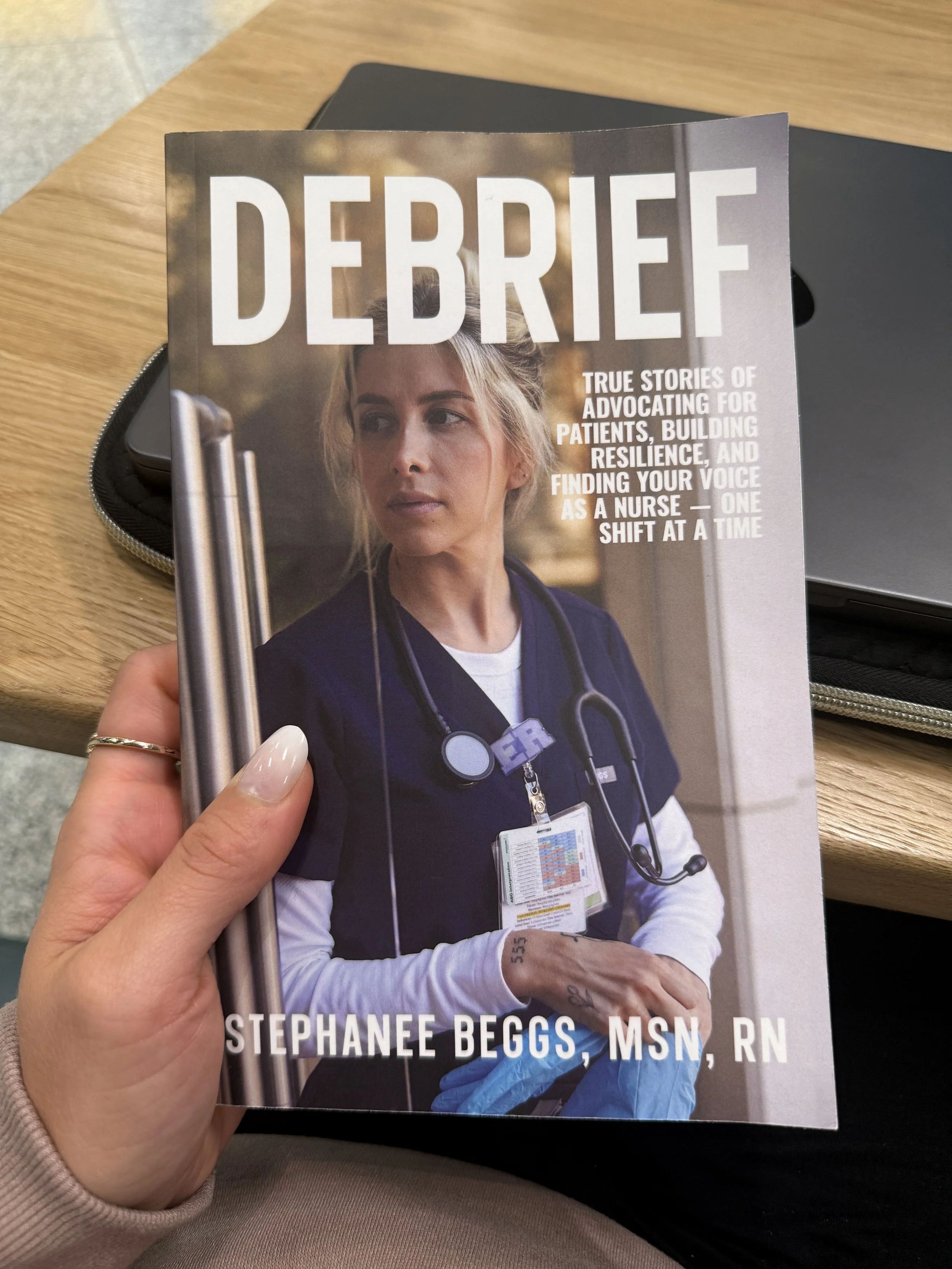Debriefing Life After Nursing School: What Stephanee Beggs’ Book Teaches Us About Nursing, Healing, and Growth
A few months ago, somewhere high above the Atlantic Ocean, I opened a book that I didn’t realize would stay with me long after I landed. It was Debrief, written by nurse, educator, and RN Explained founder Stephanee Beggs and within a few pages, I found myself completely absorbed.
I read it from start to finish on a long flight to France, pen in hand, underlining entire paragraphs and scribbling reflections in the margins. What struck me most was how seen I felt in her writing not as a nurse educator or entrepreneur, but as a nurse who remembers every.single.emotional whiplash of those early days at the bedside.
After I closed the book, one thing was clear: I needed to talk to Stephanee.
On a deeper level, I knew new nurses needed to hear from her too because Debrief isn’t just a story collection. It’s a mirror. It’s a reminder. It’s a gentle truth-telling of everything we feel but rarely articulate.
During our conversation on the Life After Nursing School podcast, we went deeper into the parts of the book that hit home for so many nurses: the emotional whiplash of the first year, the grief we carry, the moments that change us, the shock of the job market, the unruly imposter syndrome, and the quiet transformation that happens when we finally find our footing.
This blog unpacks key themes from Debrief and the intimate, honest conversation Stephanee and I shared about the emotional landscape of nursing.
The Book Every New Nurse Wishes They Had: Why Debrief Matters
So many nursing books focus on skills, evidence-based practice, or NCLEX-style content. Important? Of course.
But what nurses often need is something entirely different:
A space to process. A space to breathe. A space to be human.
That’s what Debrief delivers.
From the very first chapter, Stephanee transports you into her new grad shoes - not with clinical jargon, but through the feeling of being a new nurse: knees shaky, heart racing, mind doubting itself every other minute. She writes about her own moments of panic, heartbreak, confusion, and unexpected joy with such clarity that you can’t help but exhale and think, Finally. Someone said it.
During our conversation, I told her that this book is the emotional education nurses should receive but rarely do. And she agreed, which is exactly why she wrote it.
“I wanted to write the book I wish I’d had,” she told me.
“Something that said, ‘You’re not alone in this.’”
And that’s what makes Debrief so special: It isn’t written from the pedestal of experience. It’s written from the trenches of becoming.
The First-Year Whiplash: Finding Your Place Six Months In
One of the most powerful moments in the book happens around the six-month mark of Stephanee’s first nursing job. She writes about a moment after a shift when she realized she wasn’t driving home in tears or replaying every decision she made that day.
She wasn’t spiraling. She wasn’t questioning herself. She wasn’t drowning.
Instead, she called her Aunt Lisa and talked about something completely unrelated to work.
That moment, that shift, was her aha realization: She had finally made it, she had finally become a nurse.
This deeply resonated with me because every new nurse reaches this point at a different time, but very few are warned about the internal turbulence that comes before it.
During the podcast, I read that passage back to her, and she smiled because she remembered exactly how that moment felt.
We talked about how new nurses desperately need someone to normalize this timeline. Nursing school paints a picture that you’ll graduate ready.
But the truth is: You don’t find your footing while on orientation. You don’t feel confident after orientation ends. You don’t magically stop second-guessing yourself after you pass the NCLEX.
Instead…. you bloom slowly and often painfully.
Stephanee writes about this without sugarcoating it, and that transparency makes Debrief a lifeline for new nurses who think they’re “behind.”
Spoiler: You’re not behind. You’re becoming.
The Grief We Carry: What Nursing Doesn’t Prepare You For
One of the most emotional parts of the book, and our conversation, was when Stephanee opened up about losing her mom in nursing school — just six months before graduation. She writes about the timing, the heartbreak, the shock, and the way grief layered itself into her early nursing practice.
I asked her how she pushed through something so unimaginably painful while still showing up in school, clinicals, and eventually the ER. Her answer was honest and piercing:
“The world keeps spinning. I just had to keep going.”
That’s grief. That’s nursing. And for many of us, that’s life.
We talked about how grief affects your connection to patients, how watching someone else get more time can trigger something deeply human and painfully raw. I shared my own experience losing my father to lung cancer three years into my nursing career, and how that grief quietly entered the room with me on every shift.
These are things nurses feel deeply but don’t always have space to say.
And that’s why Debrief is so important. It gives nurses permission to acknowledge what shapes them.
The Truth About the New Grad Job Market & Why It’s Not You
One part of the book that I wished every nursing student could read is Stephanee’s story of applying to seven hospitals and facing rejection after rejection before finally landing one of two new-grad positions out of 2,000+ applicants.
Yes, you read that right.
In a chapter that blends brutality with hope, she writes about the shock of graduating during a global pandemic, at a time when nurses were being called “heroes”, yet finding out no one wanted to hire a new grad.
And we need to be honest about this: The new grad nurse job market is STILL competitive, inconsistent, and overwhelming — and nursing programs are still not preparing students for that reality.
During the podcast, we dove into the heart of this issue:
Nursing schools rarely teach job-search skills
Students often miss residency cycles without knowing
Hospitals want “cheap labor,” but new grads are actually expensive to train
The “nursing shortage” is really a shortage of experienced nurses
New grads often think rejection means something is wrong with them
Stephanee said something that every new nurse needs to hear:
“It takes six months. That’s normal. That’s okay. Keep going.”
Her story reframes rejection from a personal failure into a systemic issue, one that requires preparation, persistence, and support.
The Red Journal: Turning Real Shifts into Emotional Lessons
One of my favorite things about Stephanee’s Debrief story is the iconic red journal. This is the notebook where she documented everything she was experiencing as a new nurse and it writing in it became her version of debriefing. This red journal captured everything new nurses face:
Traumas.Tender moments. Lessons. Confusion. Self-doubt. Growth.
This journal eventually became the backbone of the book.
In our conversation, Stephanee told me she often wrote during quiet moments on night shift, not knowing yet what those entries would become. All she knew was that she needed a place to process the stories that were becoming part of her.
That’s what makes Debrief so intimate, every chapter is a glimpse into her internal dialogue, not just her clinical world.
And it’s a reminder for all nurses: Your story matters. Your reflection matters. Your debrief matters.
Whether your “red journal” is an actual notebook, a Notes app, voice memos, or quiet thoughts on your drive home, the act of processing your experience is what keeps you grounded.
Writing as Healing: The Birth of the Book
Writing Debrief wasn’t just a project, it was a therapeutic release for Stephanee.
When she shared the writing process with me, I was in awe:
She wrote almost every day for nine to ten months
She organized chapters with a writing coach
She revisited stories she hadn’t emotionally touched in years
She documented her growth in real time
She also shared a detail that made the book feel even more special:
The excerpt included at the beginning of Debrief is dated July 5th, a date that holds deep meaning for her. She has the 555 tattoo, connecting to themes of change and alignment, and July 5th marks her nursing anniversary.
This symbolism threads beautifully through the book, a reminder that change, even uncomfortable change, is often divinely timed.
Why Every New Nurse Should Read Debrief
I believe there are books you read, and books you carry with you. Debrief is the latter.
Here’s why:
It normalizes the emotional rollercoaster
The fear, the anxiety, the self-doubt - all of it is validated.
It gives new nurses words for what they often cannot articulate
Sometimes you need someone else to say, “I felt that too.”
It captures the heart of nursing, not just the tasks
The humanity. The grief. The growth. The evolution.
It bridges the gap between expectation and reality
Nursing school doesn’t prepare you with the realities of this profession. This book does.
It reminds nurses to reflect, not suppress
Because debriefing is where healing begins.
Final Thoughts: Debriefing Your Own Life After Nursing School
My favorite part of reading Debrief, and talking to Stephanee, is that it reminded me of something essential:
The things that challenge us shape us.
The moments that break us open also build us.
And every nurse, every single one, deserves space to process their story.
Whether you're a nursing student, a new grad finding your footing, or a nurse in a season of transition, Debrief invites you to pause and reflect on your journey with softness and honesty.
It reminds you that you're not alone.
It reminds you that you’re allowed to feel.
And most importantly, it reminds you that you’re becoming exactly who you’re meant to be.
Listen to the Full Conversation with Stephanee Beggs
If you want to go deeper into the themes of the book, the emotional reality of new-grad nursing, and Stephanee’s personal journey in writing Debrief, make sure to listen to our full conversation on the Life After Nursing School podcast.
It’s heartfelt, healing, and one of my favorite interviews to date.
As always, I’ve got one hand for me… and the other for you.
Until next time,
Caroline
PS. Want more on this topic? Listen to Life After Nursing School Podcast Ep 42




